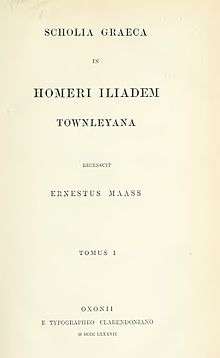Scholia
Scholia (singular scholium or scholion, from Ancient Greek: σχόλιον, "comment, interpretation") are grammatical, critical, or explanatory comments — original or copied from prior commentaries — which are inserted in the margin of the manuscript of ancient authors, as glosses. One who writes scholia is a scholiast. The earliest attested use of the word dates to the 1st century BC.[1]
| Look up scholium in Wiktionary, the free dictionary. |
History

Ancient scholia are important sources of information about many aspects of the ancient world, especially ancient literary history. The earliest scholia, usually anonymous, date to the 5th or 4th century BC (such as the "a" scholia on the Iliad). The practice of compiling scholia continued to late Byzantine times, outstanding examples being Archbishop Eustathius' massive commentaries to Homer in the 12th century and the scholia recentiora of Thomas Magister and Demetrius Triclinius in the 14th.
Scholia were altered by successive copyists and owners of the manuscript, and in some cases, increased to such an extent that there was no longer room for them in the margin, and it became necessary to make them into a separate work. At first, they were taken from one commentary only, subsequently from several. This is indicated by the repetition of the lemma ("headword"), or by the use of such phrases as "or thus", "alternatively", "according to some", to introduce different explanations, or by the explicit quotation of different sources.
Important sets of scholia
Greek
The most important are those on the Homeric Iliad, especially those found in the 10th-century manuscripts discovered by Villoison in 1781 in the Biblioteca Marciana in Venice (see further Venetus A, Homeric scholarship), which are based on Aristarchus and his school.[2] The scholia on Hesiod, Pindar, Sophocles, Aristophanes and Apollonius Rhodius are also extremely important.
Latin
In Latin, the most important are those of Servius on Virgil;[3] of Acro and Porphyrio on Horace;[4]; and of Donatus on Terence.[5] Also of interest are the scholia on Juvenal attached to the good manuscript P;[6] while there are also scholia on Statius,[7] especially associated with the name Lactantius Placidus.[8]
List of ancient commentaries
Some ancient scholia are of sufficient quality and importance to be labelled "commentaries" instead. The existence of a commercial translation is often used to distinguish between "scholia" and "commentaries". The following is a chronological list of ancient commentaries written defined as those for which commercial translations have been made:
- Asconius (c. 55 AD) on Cicero's Pro Scauro, In Pisonem, Pro Milone, Pro Cornelio and In Toga Candida
- Servius (c. 400 AD) on Virgil's Aeneid
- Macrobius (c. 400 AD) on Cicero's Dream of Scipio
- Proclus (c. 440 AD) on Plato's Parmenides and Timaeus and Euclid's Elements
- Boethius (c. 520 AD) on Cicero's Topics
Other uses
- Spinoza provided his own scholia to many of the propositions in his Ethics, commentaries upon and expansions of the individual propositions, or sometimes short conclusions to sections of argumentation running over a number of propositions.
- In modern mathematics texts, scholia are marginal notes which may amplify a line of reasoning or compare it with proofs given earlier. A famous example is Bayes' scholium, in which he presents a justification for assuming a continuous uniform distribution for the prior of the parameter of a Bernoulli process.[9] Another famous example of a somewhat different use is to be found in Brook Taylor's Methodus Incrementorum, in which the propositions demonstrated are often followed by a scholium which further explains the significance of the proposition.
- Scholia is an academic journal in the field of classical studies.[10]
- Search engine relying on wikidata, mainly for scientific publications: Scholia
- Nicolás Gómez Dávila was one of the most radical critics of modernity whose work consists almost entirely of aphorisms which he called "escolios" ("glosses") of an implicit text.
References
Citations
- Cicero Ad Atticum 16.7.
- J E Sandys, A Dictionary of Classical Antiquities (London 1894) p. 65
- J E Sandys, A Dictionary of Classical Antiquities (London 1894) p. 683
- A Palmer, The Satires of Horace (London 1920) p. xxxvii
- J E Sandys, A Dictionary of Classical Antiquities (London 1894) p. 197
- J D Duff, Fourteen Satires of Juvenal (Cambridge 1925) p. xliii
- R Sweeny, Prolegomena to an Edition of Scholia on Statius (1969) p. 2-8
- H J Rose, A Handbook of Latin Literature (1967) p. 483
- Murray, F. H. (February 1930). "Note on a scholium of Bayes". Bulletin of the American Mathematical Society. American Mathematical Society. 36 (2): 129–132. doi:10.1090/s0002-9904-1930-04907-1. Retrieved 3 January 2018.
- Scholia, Scholia reviews Archived 1 July 2001 at the Wayback Machine
Sources
- Dickey, Eleanor. Ancient Greek Scholarship: A Guide to Finding, Reading, and Understanding Scholia, Commentaries, Lexica, and Grammatical Treatises. Oxford: OUP for the APA, 2007. ISBN 0-19-531293-7.
- Reynolds, L.D. and N.G. Wilson. Scribes & Scholars: a Guide to the Transmission of Greek & Latin Literature, 3rd ed. Oxford: Clarendon Press, 1991. ISBN 0-19-872146-3.
